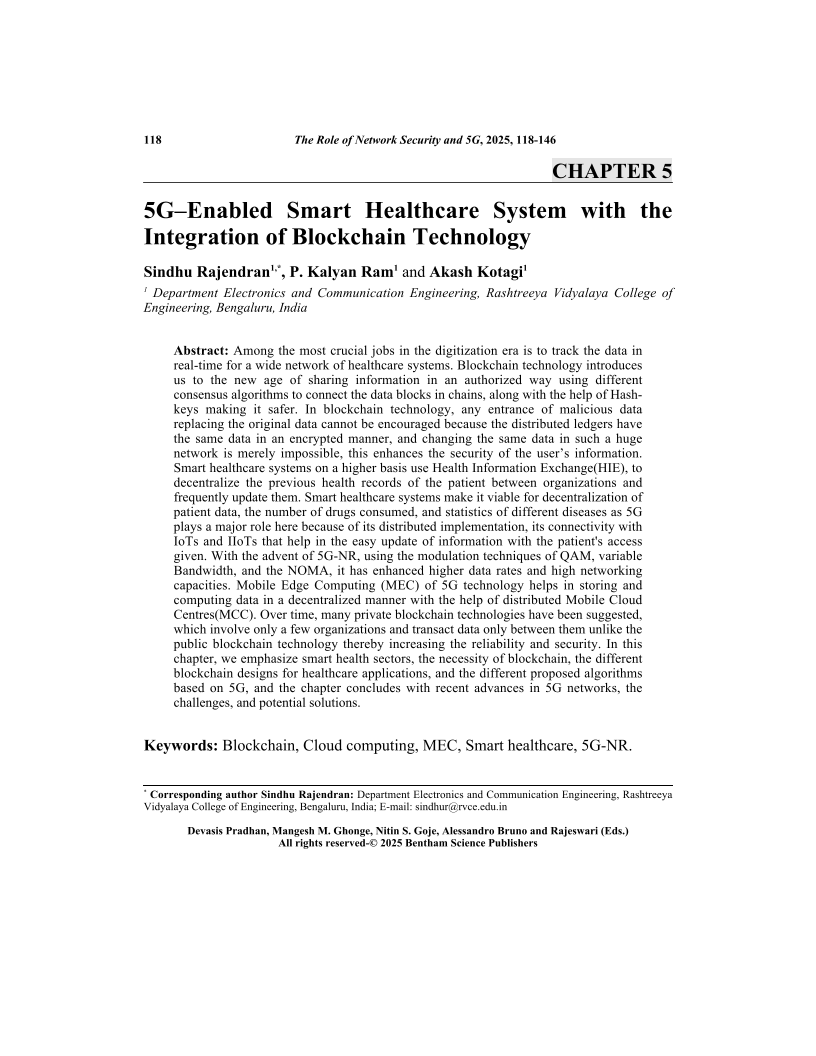5G-Enabled Smart Healthcare System with the Integration of Blockchain Technology

- Authors: Sindhu Rajendran1, P. Kalyan Ram2, Akash Kotagi3
-
View Affiliations Hide Affiliations1 Department Electronics and Communication Engineering, Rashtreeya Vidyalaya College of Engineering, Bengaluru, India 2 Department Electronics and Communication Engineering, Rashtreeya Vidyalaya College of Engineering, Bengaluru, India 3 Department Electronics and Communication Engineering, Rashtreeya Vidyalaya College of Engineering, Bengaluru, India
- Source: The Role of Network Security and 5G Communication in Smart Cities and Industrial Transformation , pp 118-146
- Publication Date: February 2025
- Language: English
5G-Enabled Smart Healthcare System with the Integration of Blockchain Technology, Page 1 of 1
< Previous page | Next page > /docserver/preview/fulltext/9789815305876/chapter-5-1.gif
Among the most crucial jobs in the digitization era is to track the data in real-time for a wide network of healthcare systems. Blockchain technology introduces us to the new age of sharing information in an authorized way using different consensus algorithms to connect the data blocks in chains, along with the help of Hashkeys making it safer. In blockchain technology, any entrance of malicious data replacing the original data cannot be encouraged because the distributed ledgers have the same data in an encrypted manner, and changing the same data in such a huge network is merely impossible, this enhances the security of the user's information. Smart healthcare systems on a higher basis use Health Information Exchange(HIE), to decentralize the previous health records of the patient between organizations and frequently update them. Smart healthcare systems make it viable for decentralization of patient data, the number of drugs consumed, and statistics of different diseases as 5G plays a major role here because of its distributed implementation, its connectivity with IoTs and IIoTs that help in the easy update of information with the patient's access given. With the advent of 5G-NR, using the modulation techniques of QAM, variable Bandwidth, and the NOMA, it has enhanced higher data rates and high networking capacities. Mobile Edge Computing (MEC) of 5G technology helps in storing and computing data in a decentralized manner with the help of distributed Mobile Cloud Centres(MCC). Over time, many private blockchain technologies have been suggested, which involve only a few organizations and transact data only between them unlike the public blockchain technology thereby increasing the reliability and security. In this chapter, we emphasize smart health sectors, the necessity of blockchain, the different blockchain designs for healthcare applications, and the different proposed algorithms based on 5G, and the chapter concludes with recent advances in 5G networks, the challenges, and potential solutions.
-
From This Site
/content/books/9789815305876.chapter-5dcterms_subject,pub_keyword-contentType:Journal -contentType:Figure -contentType:Table -contentType:SupplementaryData105

